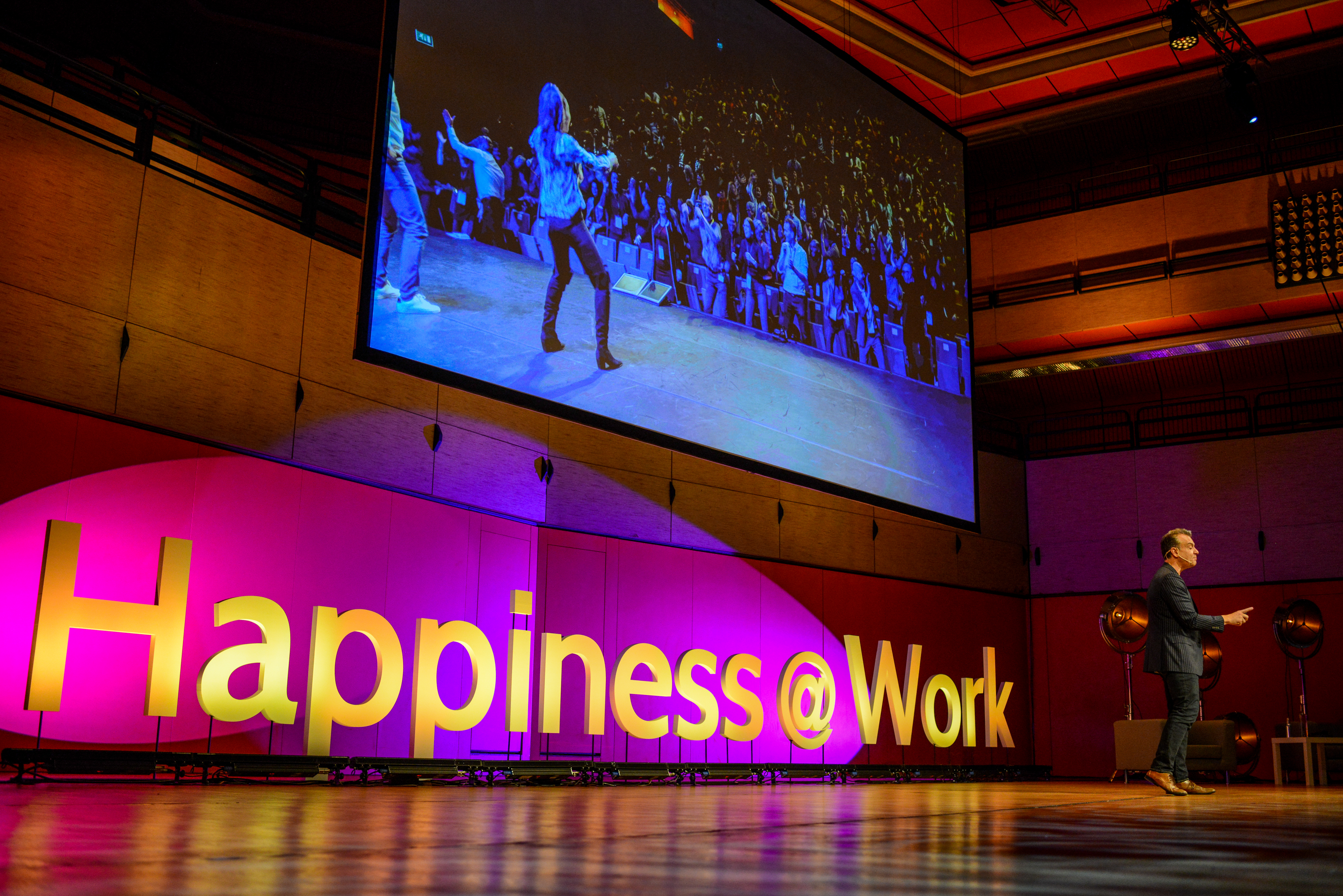2 days, 20 speakers and 200 participants from 25 countries. Here are the highlights from our 2019 International Conference On Happiness At Work.
How to be happy at work
2 days, 20 speakers and 200 participants from 25 countries. Here are the highlights from our 2019 International Conference On Happiness At Work.
There is a tremendous amount of research that shows that happiness is great for employees AND for the company’s bottom line.
In this speech from our conference in 2017, I go through all the research and show why the future belongs to the happy.

Measuring employee happiness is a great idea.
Sure, it has its problems. Any time you measure anything, you run the risk of getting bad data, the wrong data or making bad decisions based on the data.
But it still makes sense for two main reasons.
First and most obviously, if you measure employee happiness right, it can actually guide efforts to improve the workplace by identifying organizational problems and strengths.
Also, most business leaders are highly results oriented and data driven and find it hard to value things they can’t put a number on. Tracking employee happiness with hard numbers in some way can bolster organizational commitment to happiness initiatives.
So what can you measure? This can go way beyond just an annual job satisfaction survey. It’s essential to find the metrics that are relevant to your employees, your customers and your organization.
Here are all the potential ways we’ve come up with to measure employee happiness. Did we forget any? Write a comment if you have one we didn’t include.
If you want to know how happy your employees are, you can quite simply ask them. The traditional way is of course to run annual satisfaction surveys but I’m very skeptical about that approach.
You can measure things like:
You can conduct the measurement using surveys, apps, mood boards or even just tennis balls.
Two other obvious employee-related metrics are:
Each of these have a direct bottom line impact and are directly correlated with employee happiness.
Happy organizations also attract more and better new hires. That means that you could also measure on metrics like:
This will be especially relevant in fast-growing workplaces or in industries where there is strong competition for the best talent.
We know that happy employees make the customers happy. Some potential metrics are:
We also know that happy employees do a better job, so measuring happiness could also mean tracking metrics like:
Given that happy employees are less likely to engage in bad behavior at work, we could also track metrics like:
This area is a little more speculative but some people have suggested measuring things like:
These do raise some ethical issues around privacy and bodily autonomy.
Measuring employee happiness can help efforts to improve a workplace and strengthen leadership’s focus and commitment to these efforts.
While traditional satisfaction surveys have a long list of problems, there are many other metrics you can look at.
No workplace should measure all of these metrics. Depending on the industry, situation and type of employees only a small subset of these will be relevant. It’s up to each workplace to define which are the most relevant and to find a good way to track and act on these metrics.
We have collected all our best insights and experiences on this topic and developed a tool called heartcount which allows any team or workplace to measure happiness at work simply and in a way that generates actionable insights. Read all about it here.

Today on May 1st it’s fitting to celebrate how much workplaces have improved, thanks in large part to unions and worker movements.
These are the factory rules for an 1800s Manchester cotton factory. Scary today, but perfectly normal back then! Without strong organized labor, it might still be acceptable to treat workers like this.

In 2015 we started the Woohoo Inc Partnership and we now have partners promoting happiness at work in 30 countries.
We are incredibly proud to be supporting these amazing people. Here are some examples of the fantastic work they do.
Grupo Aukera in Buenos Aires did a teambuilding workshop for a big international insurance company where the teams had to work together to assemble bicycles.
But there was a surprise:
While the teams were working, they all thought that the bicycles would be drawn by the participants or that they would be left for the winning group.
The surprise was that by the end of the game when the bicycles were finished, the real “clients” were poor children who received help from an NGO and used bicycles not only for playing but also to go to school or to the dining room where they they served food daily. In this way the concept of “Results” came up very clearly, understanding the meaning of our work.
What a great idea – and one that lead to a 50% improvement in that division’s satisfaction surveys.
Randa Farah of I have Learned Academy arranged a conference on happiness at work in Beirut and over 300 people came and saw some great local and international speakers at a very creative and fun event.
Tryangle are currently running a program which consists of a hybrid pack of webinars and keynotes on how to become happier at work with a focus on teamwork and communication. Griet Deca from Tryangle noted that:
Everybody in the department can enroll in their activities and for the first webinars we had a lot of participants. They were actively engaged creating a lot of interaction. And that made Kim, who did the webinar, also happy!
Hybrid learning tracks help to a) balance the budget and b) keep the happiness-idea alive all through the year. The fact that the participants of the webinars will meet the webinar animator is a big added value according to the feedback we get.
The public sector needs more happiness at work and doing a blend of online and physical learnings helps make the training more effective and affordable.
Many Central and Eastern European countries have no tradition for focusing in happiness at work so getting attention can be tough. But Kasia Kern has been very successful in changing the conversation using a combination of social media, webinars and physical meetups.
I put together 1 hour webinar called “10 ways to become happier a work”. I remember that I posted it in the network and I literally went for vacation with my family. While sitting on the beach, I couldn’t believe what was happening, I was getting one email after another notifying me that another person register on my webinar.
When I came back I did my first webinar for 100 people, much more than I expected. So I repeated it several times and there was a similar audience each time.
I then decided to organize a few free of charge meetings in the biggest cities in Poland, to share more on Happiness at Work and included local companies to share their best practices. These events have also been sold out and attracted a lot of attention.
She will also be doing Poland’s first conference on happiness at work later this year!
Our partners in the Czech Republic have done an annual conference on happiness at work for 4 years. It started out small with 70 participants but the latest edition had over 500 attendees, making it the biggest conference about happiness at work anywhere in the world.
Sarah Metcalfe of Happy Coffee Consulting in the UK gave the closing keynote at a conference called When Digital Becomes Human. She got awesome feedback, lots of questions and a 4.5/5 speaker rating.
Petra and Maja of Paleta Znanj managed to get workplace happiness into some of the major business publications in Slovenia:
We prepared two articles on happiness at work for two professional magazines and they will be published in April and May. First will be an article for Direktor (a magazine focusing on development of managers) with more focus on long term and strategic advantages of H@W and leading with happiness. The second one comes out in May for an HRM magazine (focused on HR professionals) about happiness at work and its importance for a positive organizational culture.
Both magazines have a reach of few thousands, which is quite a lot for our country.
Games are a great path to learning and PlusConsulting in Israel have launched one that is focused on strengths and happiness at work:
FINDING THE PLUS is an interactive fun game that boosts happiness and enables participants to learn tools and solutions from the sciences of happiness at work and positive psychology.
“Finding the PLUS” game, will help you learn to implement and practice the positive perspective in a fun and engaging way. Through the game the players will get familiar with the four aspects of positive psychology: mental, emotional, physical and social. They will learn and practice new techniques that will enable them to increase their happiness level, become more empowered, improve their performance as well as their wellbeing.
How awesome is that!
People 3.0 arranged their country’s first ever conference on workplace happiness with local and international speakers and 100 participants.
There are many, many more great things coming from the partner network. They are, without exception, smart people with great skills who are doing amazing work. If you’re looking for a local speaker or consultant to make your organization happier and more successful, you can see the whole list of partners here.
Are you interested in becoming a partner? Read all about the partnership here.

Jack Ma, the billionaire founder of Chinese tech company Alibaba, has come out in favor of the so-called 996 rule, i.e. that you should work from 9am to 9pm 6 days a week if you want to have a successful career. For anyone doing the math that’s 72 hours of work a week. Add a 1 hour commute on top of that and there’s very little time left for your family, kids, hobbies, exercise and life in general.
“I personally think that 996 is a huge blessing,” he said. “How do you achieve the success you want without paying extra effort and time?”
He also added that you can only achieve business success through suffering and sacrifice.
I realize I may be wasting my time here by going up against a belief that is so prevalent among business leaders, but there’s no way I can let that kind of nonsense pass and not point out exactly why it’s wrong. Here are 5 quick reasons:
1: Pointing to successful people that achieved success by working 72 hours a week proves nothing. What about all the people that worked just as hard but failed?
2: Many of the mental qualities that make a person successful at work are lost when people are overworked, tired, stressed and unhappy, including networking, creativity and effective decision making.
3: Permanent overwork kills people. For instance, those working a 55-hour week face 33% increased risk of stroke.
4: Permanent overwork doesn’t result in increased output.
5: Many people believe that success can only be achieved through suffering, but they’re wrong. In fact, employee happiness leads directly to higher performance and business success.
So permanent overwork does not lead to increased results and success – in fact it hurts people AND profits.
It’s easy to point to Alibaba and say “But they work really long hours and the company is successful. Check mate!” But that’s just correlation; where is the proof that they are profitable BECAUSE OF the long working hours? Maybe they would’ve been even more profitable if their employees were happy, relaxed and had lives outside of work too? The research certainly indicates that.
So why do so many people still believe this nonsense? As the psychologist Daniel Kahneman noted, it’s difficult to change people’s minds. Look at this picture:

Every horizontal line is perfectly straight. Don’t believe me? Hold up a ruler to your screen and check. OK, now that you know the horizontal lines are straight, what does your mind see? Bendy lines.
Kahneman notes that cognitive illusions are even more stubborn than visual illusions and the business leaders he has worked with almost never changed their beliefs no matter how much evidence they were presented with.
Fortunately, there are also many enlightened leaders out there:

And US Vice President Joe Biden wrote an awesome memo to his staff that said in part:
I do not expect, nor do I want any of you to miss or sacrifice important family obligations for work.
There is strong evidence that permanent overwork hurts people and performance. Let’s stop promoting such a dumb and dangerous idea.

When is your next meeting? Tomorrow? This afternoon? Or are you already late for your next meeting?
We spend a lot of time in work meetings and they don’t seem to make us very happy.
So here’s a simple tip you can try very easily: Open your next meeting with a round where each person shares something positive. You can pick one of these questions and let everyone share:
Don’t spend a lot of time on this, just give each participant about 30 seconds to share something positive. If the group is bigger than 10-12 people, let people share in pairs and then let 3 or 4 people share with the whole group so it doesn’t take more than a few minutes.
It really works wonders for a meeting. One person told me this after trying it out:
Hi Alexander,
I have been reading your work for a few days now, and I cannot get enough.
We have 4 analysts on our team, who touch many if not all groups in our company. Our role often means our view is black and white in order to deliver results, which is often received in a bad light.
So, I tried starting a meeting with something positive. It was like the Jedi mind trick for convincing others to lobby for our interests!
My Sr Analyst was struggling to keep her jaw from dropping. No more than a simple ask of what is the funniest thing your kids have said to you lately. Everyone had a story, and we all laughed for a quick 2 minutes before getting to the agenda.
Just wanted to say, “Thank you,”
All the best,
-Grant
And it’s not only fun, it will also make your meeting more effective as this experiment shows:
Psychological experiments can be very devious, and this one was certainly no exception. The focus was meetings and the format was simple: Groups of people were asked to discuss and reach consensus on a contentious topic.
Here’s the devious bit: Unbeknownst to the other participants one member of the group was an actor hired by the researchers. The actor was told to speak first in the discussions. In half the experiments he would say something positive while in the other half he would start by saying something critical. After that he simply participated in the discussion like the other group members.
The experiment showed that when the first thing said in the meeting was positive, the discussion turned out more constructive, people listened more and were more likely to reach consensus. When the first statement was negative the mood became more hostile, people were more argumentative and consensus became less likely.
The researchers concluded that the way a meeting starts has a large impact on the tone of the discussion and on whether or not the group will eventually reach consensus.
Try it out and let me know how it works for you.

Last week I spoke at the first Italian conference on happiness at work arranged by our awesome partners People 3.0.
One of the other speakers put up this quote by Adriano Olivetti, son of the founder of the Olivetti company in the original Italian. To the best of my knowledge, this quote has not previously been translated, so here it is in English for the first time.

I met a manager recently who claimed in no uncertain terms that companies should forget all about employee happiness and focus only on engagement. He argued that people can be happy at work without performing well, whereas employee engagement leads directly to better performance.
I’ve actually heard this claim a few times recently, but it is still wrong. In this article we’ll look at why.
But first let’s define the two terms. Both can be defined in many different ways, which will confuse any discussion, so here are the definitions I will base my argument on.
This is the first result that comes up when you google “employee engagement definition”:
Employee engagement is the extent to which employees feel passionate about their jobs, are committed to the organization, and put discretionary effort into their work.
And this is the definition of happiness at work that we use:
Happiness at work is the extent to which employees feel good about their jobs.
Both are clearly emotional at their core (the word “feel” appears in both) but the key difference is that engagement is more about the work and less about the person. It’s not really about how you feel in general, it’s how passionate you feel about your job, how committed you are to the workplace and how much extra effort you put in.
Happiness at work, as we define it, is how work makes you feel more broadly. It’s not about feeling good every second of every work day, but it is about experiencing mostly positive feelings about your job.
Just to make it clear: We think employee engagement is a useful concept and we are not arguing against it. We just want to argue that of the two, it is much more effective for a company to focus on making their employees happy than on making them engaged. Here are the four main reasons why.
Whether you’re looking to create employee happiness or engagement, you need your employees to be active partners in the process. This is not something you can do to them without their active and willing participation or (even worse) against their will.
Employee engagement, being directly related to commitment and effort, is a very easy sell to managers and companies. Every manager wants employees who are passionate about their work and go above and beyond to do a better job.
But seen from the employee side, it’s a much harder sell. When a manager states that they want their employees to “be more engaged in their work” or “give more discretionary effort” it can easily come off as if they are simply demanding more passion and work from people, without giving anything back.
On the other hand, when a manager sets a goal to create a happy workplace, the benefits are immediately clear to employees and it’s much easier to engage them in the process.
Ironically, happiness can be a harder sell towards managers, many of whom are skeptical of “all that happiness crap”. This video covers their most common objections and why they’re wrong:
How engaged can someone really be if they’re unhappy at work?
This happens. One of our International Partners, Sheona McGraw of Cloud 9 to 5 in Canada has seen it first hand:
Having worked in a number of charities, non-profit orgs and social enterprises, I can tell you that most of these employees are passionate and committed about their org’s cause but unfortunately a lot of the orgs don’t have a very happy work environment and it’s not uncommon at all to find super engaged yet super unhappy employees working in these orgs.
This is something I talk a lot about in my discussions with potential clients. I myself have been in this circumstance a number of times, being super engaged but miserable. And while I performed satisfactorily, had I been happy I would have blown the job out of the water.
A person can be incredibly passionate about their work and totally committed to the workplace, but still be miserable at work. I’ve seen this happen for instance when people are treated badly by their coworkers or manager or when they can’t do their job in a way that satisfies their own professional standards.
In this case, two things can happen:
So even if you want an engaged workforce, you still need to focus on making them happy because engagement without happiness is not sustainable.

Sure, engagement leads to better performance – but given the definition above that includes commitment and extra effort, that’s almost a tautology.
Furthermore, we know from a large amount of research, that happy employees perform much better. Ed Diener, one of the world’s leading happiness researchers summed it up like this:
In the workplace we know that happiness causes more-productive and more-creative workers.
If you know academics, you know how careful they are about using the word “causes.” In this case, we know that happiness at work causes higher:
So employee happiness has been shown to directly cause increased performance.
You’ll notice that both loyalty and discretionary effort were part of the definition of engagement that we presented above.
Given that (as we saw in the previous section) happy employees are more loyal and are more likely to go the extra mile, it’s clear that happiness doesn’t only cause better performance – happiness also directly causes engagement.
Of course, the effects are circular and engagement and happiness will cause each other. But given the results above as well as the fact that engagement cannot last in the absence of happiness, it seems clear to me that happiness causes engagement more than engagement causes happiness.
Gallup does a lot of great work on employee engagement and their Q12 survey is one of my favorite metrics. They also acknowledge that many factors play into engagement, including happiness / well-being, writing:
Leaders have to think about everything from culture to well-being to purpose and meaning — and make it all come to life in a personalized way for employees.
Engagement is a great concept but ignoring employee happiness in the pursuit of engagement makes no sense.
At the very least, sustainable engagement requires happiness at work, meaning you can’t ignore the happiness aspect.
When do people feel “passionate about their work, committed to the workplace and give discretionary effort?” When they’re happy at work!
So if you want engaged employees, focus on making them happy and engagement will follow.

Most managers have realized by now that happy workplaces are more productive, more creative, attract better talent and make more money.
So if you were a well-meaning manager or HR person looking to capitalize on this and create a happier workplace, you might be tempted to start by asking your employees some version of this question:
“What would make you happier at work?”
It seems like a great place to start. To make people happier, ask them what they want and them give them that. Right?
Wrong.
Here’s why: We know from the research that people are notoriously bad at predicting what will make them happy.
Stop random people on the street and ask them what would make their lives happier and a lot of them will reply “Winning the lottery.” But studies of lottery winners show that they are actually only marginally happier than all of us non-lottery millionaires.
Similarly if you ask employees what will make them happier at work you will most likely get responses like:
But while all of this sounds perfectly reasonable (indeed, you might give some of the same answers if asked the same question), we know from the research that these factors don’t make employees any happier at work. Just to be clear: We cannot ignore them when making workplaces better, because these factors can absolutely make people unhappy when they’re unfair. But once they are fair, increasing them further does not increase happiness at all.
This explains why many organizations spend a ton of time and money on every perk imaginable and employees are still not happy.
Quite simply: giving employees what they ask for is doomed to fail, if they don’t know what to ask for. And they don’t.
What we need to do instead, is help people discover for themselves what really makes them happy at work and there’s a much better question for that:
Tell me about a recent good experience at work that made you happy.
This may look like essentially the same question as the one above so why is this one better? With the previous question (What would make you happy at work) we only get at the things people think will make them happy.
With the latter question, we ask about specific previous experiences that caused happiness. This means that we get directly at what really works.
I have used this question in hundreds of speeches all over the world and never once has anyone told a story of getting a raise, a promotion or a perk. Never once has anyone said “I was really happy last Thursday because I got a free apple.”
The one exception was when I did a workshop at Lego and an employee shared this example:
Every week our team gets a new box of fruit and there’s always only one banana in it. If I get there in time to get that one banana, it makes me really happy!
I’m 98% sure he was kidding!
Invariably, when people reflect on this question their stories fall into two categories.
They either talk about doing good work, achieving great results or making a positive difference for others. This includes things like:
I had a complicated problem on a project and found a really creative solution for it.
A customer liked my work so much they sent me an email with tons of positive feedback.
I helped a coworker by sharing advice and knowledge.
Or they talk about moments of personal connection at work, like:
I came back to the office from parental leave last week and so many people on my team welcomed me back with smiles and hugs.
I had a bad day and my manager noticed and did her best to help me.
We celebrated a team member’s birthday last week with cake and coffee and had a great time together.
Very often their stories contain both elements. That’s why we talk about results and relationships being the two main sources of happiness at work.
Don’t ask your employees what will make them happy – because they probably have completely the wrong idea and giving them what they ask for won’t work. Instead, help them connect to past positive experiences because those are a much more reliable predictor of future happiness. And then work on doing simple daily actions that promote a feeling of results and relationships.